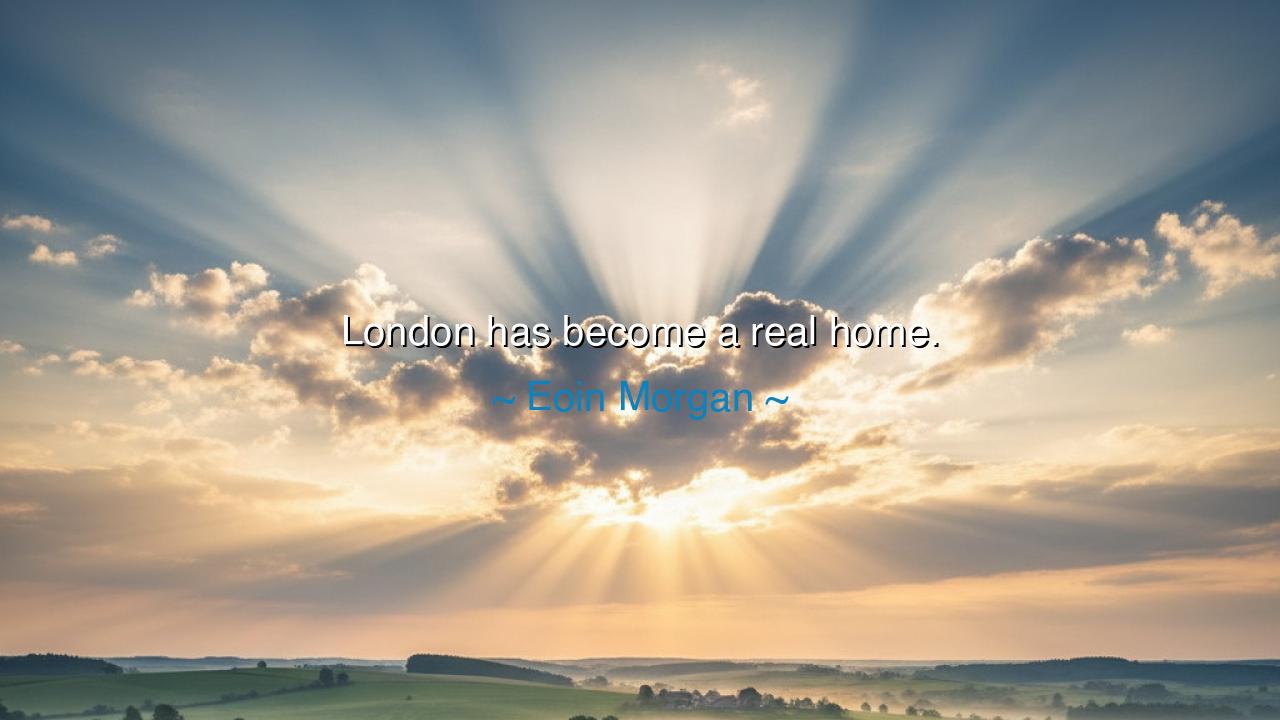
London has become a real home.






“London has become a real home.” Thus spoke Eoin Morgan, a man who journeyed from one land to another, and in doing so, found not merely a city, but a sanctuary for his soul. His words are simple, yet they carry the profound heartbeat of belonging. For what is home, if not the place where one’s spirit finally rests—where the wandering heart ceases its search and whispers, Here, I am known; here, I am whole. The quote is not about geography, but about transformation—the moment when a place once foreign becomes a part of who we are, when its rhythm joins our own, and its story mingles with ours.
To say that London has become a real home is to speak of that mysterious alchemy by which distance turns into closeness, and roots grow in unexpected soil. Morgan, born in Dublin, once wore the colors of Ireland, but destiny called him to England, where he would rise to lead another nation’s cricketing heart. In that journey, he crossed not only borders but also the invisible boundaries of identity. He had to face the loneliness that follows those who dare to begin anew. Yet through patience, courage, and faith, the city that once felt vast and indifferent became his own hearth. This is the essence of his words: that home is not inherited—it is built.
In the great scroll of human history, countless souls have shared this pilgrimage. Think of Marcus Aurelius, the philosopher-emperor, who wandered the frontiers of the Roman world, writing in his tent beneath cold northern skies. To him, the empire’s farthest reaches became home, because he carried the fire of his spirit within him. Or think of Mahatma Gandhi, who found spiritual awakening not in India but in South Africa, and who returned to his homeland with eyes reshaped by exile. So too, Eoin Morgan’s London became a mirror of his inner journey—a testament that belonging is not about origin, but about becoming.
The ancients taught that the world itself is the dwelling place of the soul, and that the wise man makes every land his home. Yet this truth is not easily lived. It takes time for foreign streets to whisper our name, for strange skies to feel like guardians instead of strangers. To declare a place a “real home” is to say: I have wrestled with alienation, I have endured the silence of unfamiliar nights, and at last, I have found peace. It is an act of quiet triumph, for home is not given to us—it must be earned through presence, gratitude, and love.
There is a beauty in Morgan’s phrasing, for he does not say “London is my home,” but “London has become a real home.” That word—become—is the bridge between longing and arrival. It acknowledges the slow unfolding, the many steps of acceptance, and the transformation of self that must occur before any place can truly belong to us. Just as a seed must adapt to foreign soil before it flowers, so must the heart adapt to the rhythm of a new land before it can rest. And when it does, it grows deeper, stronger, wiser. Such is the quiet nobility of migration, whether across oceans or within the soul itself.
From this quote, we learn that home is not a fixed point—it is a relationship. It is something we cultivate with attention and openness. The traveler who curses every unfamiliar custom will remain a stranger forever. But the one who listens, who learns the music of a new people, who lets the city’s heartbeat sync with their own—such a person finds home wherever they stand. Therefore, let each of us, when we find ourselves in strange lands—literal or metaphorical—remember that belonging is born of patience and love, not of possession or birthright.
And so, dear listener, take this teaching as your own: carry the spirit of home within you. Let it not be tied to bricks or soil, but to kindness, connection, and courage. When you find yourself far from what you know, do not despair. Walk the streets, breathe the air, greet the people. In time, the foreign will soften, the strange will become familiar, and the city will begin to recognize you. Then, like Eoin Morgan, you too may one day look around and say with quiet joy, “This place—once distant—has become a real home.”






AAdministratorAdministrator
Welcome, honored guests. Please leave a comment, we will respond soon